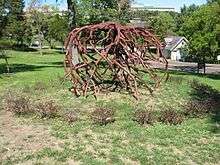Steve Tobin
| Steve Tobin | |
|---|---|
| Born |
1957 Philadelphia, Pennsylvania, US |
| Nationality | American |
| Occupation | sculptor |

Steve Tobin (born 1957, Philadelphia, Pennsylvania)[1] is an American sculptor. Much of his work draws inspiration from nature, and the Christian Science Monitor has described his sculptures as "monuments to the meeting of science and art".[2]
He studied theoretical mathematics at Tulane University, graduating with a B.S. in 1979,[3] and works from a studio/foundry in Bucks County, Pennsylvania.[4] His works have included an igloo fashioned from the windows of M60 Patton combat tanks, and glass cocoons that he hung in a chapel in Antwerp.[4]
In 1993, he created an installation at Retretti in Punkaharju, Finland, an art museum in a series of artificial caves. He filled the caves with tall, "totemic" glass sculptures, and created a "waterfall" from strands of glass. After the exhibition, he ceased to work with glass, stating later that "I retired from glass because I could never top what I did at Retretti".[4]
Five years later, he gave a show at Fuller Museum of Art in Massachusetts featuring bronze castings of Ghanaian termite mounds; he had become interested in Ghana after having an assistant from the country.[4] In 2002, the Page Museum in Los Angeles gave an exhibition of his work titled "Tobin's Naked Earth: Nature as Sculpture", beside the La Brea Tar Pits. The show included the termite mound castings, a metal casting of the root system of a tree, and a sculpture fashioned from bone marrow.[2]
In 2005, Tobin installed what is perhaps his best known work, Trinity Root, originally placed at St. Paul's Chapel in Lower Manhattan, New York City. During the September 11 attacks on the World Trade Center, the chapel had been partly shielded from damage by a 70-year-old sycamore tree. He created a bronze sculpture of the tree's stump and roots, which now sits in front of the church on the corner of Wall Street and Broadway. Tobin financed the $330,000 sculpture himself, taking out a home equity loan to do so.[5] In December 2015, Trinity Church, who owns the sculpture under an agreement with Tobin, moved the piece from its former location to the site of the church's conference center in West Cornwall, Conn. without the artist's consent. The decision has created controversy, with the artist claiming that the removal was unjustified and damages resulted.[6]
For more than a decade, Tobin also worked with exploding small charges in blocks of clay and then firing the results, some of which were featured at the Payne Gallery of Moravian College.[7]
References
- ↑ "Steve Tobin, Walking Roots". Laumeier Sculpture Park. Retrieved 11 September 2012.
- 1 2 Gloria Goodale (October 18, 2000). "The roots of his art". The Christian Science Monitor. – via HighBeam Research (subscription required) . Retrieved 11 September 2012.
- ↑ "Steve Tobin--Biography" (PDF). stevetobin.com. Archived from the original on 11 September 2012. Retrieved 11 September 2012.
- 1 2 3 4 Christine Temin (January 31, 1998). "Making Mountains out of Termite Hills". The Boston Globe. – via HighBeam Research (subscription required) . Retrieved 11 September 2012.
- ↑ Randy Kennedy (July 6, 2005). "Uprooted in the Attacks, Now Planted in Bronze". The New York Times. Archived from the original on 11 September 2012. Retrieved 11 September 2012.
- ↑ Barron, James (2016-07-06). "Artist 'Still in Shock' After Trinity Church Uproots, and Damages, His 9/11 Work". The New York Times. ISSN 0362-4331. Retrieved 2016-07-07.
- ↑ Steve Siegel (January 28, 2012). "Renowned sculptor Steve Tobin explodes clay to create other-wordly art". The Morning Call. – via HighBeam Research (subscription required) . Retrieved 11 September 2012.